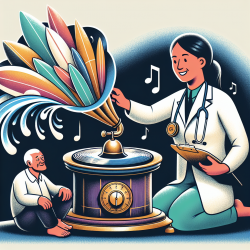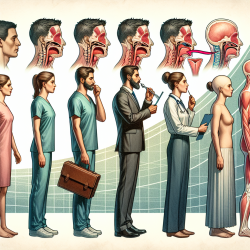As a practitioner in the field of speech-language pathology, it's essential to stay informed about the latest research and how it can be applied to improve therapy outcomes. One significant study that can inform your practice is "Spontaneous discontinuation of distressing auditory verbal hallucinations in a school-based sample of adolescents: a longitudinal study" published in the European Child & Adolescent Psychiatry journal. This research provides valuable insights into predictors of spontaneous discontinuation of distressing auditory verbal hallucinations (AVH) in adolescents.
Distressing AVH are auditory hallucinations that cause significant distress and can impact an adolescent's mental health and daily functioning. Understanding the factors that contribute to the spontaneous discontinuation of these hallucinations can help practitioners develop more effective intervention strategies.
Key Findings from the Study
The study followed 123 adolescents who reported distressing AVH at baseline and completed follow-up measurements. During the follow-up period, 65% of these adolescents no longer experienced distressing AVH. The researchers identified several predictors for the spontaneous discontinuation of distressing AVH:
- Never having used cannabis
- Parents not being divorced in the past year
- Never having been scared by seeing a deceased body
- Less prosocial behavior
- School grade repetition
- Having the feeling that others have it in for you
- Having anxiety when meeting new people
- Having lived through events exactly as if they happened before
- Having the feeling as if parts of the body have changed
Implications for Practice
Based on these findings, practitioners can take several steps to enhance therapy for adolescents experiencing distressing AVH:
- Discourage Cannabis Use: Educate adolescents and their families about the potential negative impact of cannabis use on mental health, particularly in relation to AVH.
- Support for Family Stability: Provide resources and support to families undergoing divorce to minimize the emotional impact on adolescents.
- Trauma-Informed Care: Incorporate trauma-informed practices in therapy to address the impact of traumatic experiences, such as witnessing a deceased body, on AVH.
- Behavioral Interventions: Address prosocial behavior and social interactions in therapy. While less prosocial behavior was associated with AVH discontinuation, it's essential to understand the context and address any underlying social or emotional issues.
- Academic Support: Monitor and support adolescents who have repeated a school grade, as this was associated with AVH discontinuation. Provide academic and emotional support to help them succeed.
- Addressing Anxiety and Paranoia: Develop interventions to manage anxiety and feelings of paranoia, as these were predictors of AVH discontinuation.
Encouraging Further Research
While this study provides valuable insights, several predictors were difficult to interpret and require further investigation. Encouraging continued research in this area can help clarify these predictors and improve intervention strategies. Practitioners can also contribute to research by documenting and sharing their clinical experiences and outcomes with adolescents experiencing AVH.
To read the original research paper, please follow this link: Spontaneous discontinuation of distressing auditory verbal hallucinations in a school-based sample of adolescents: a longitudinal study.










